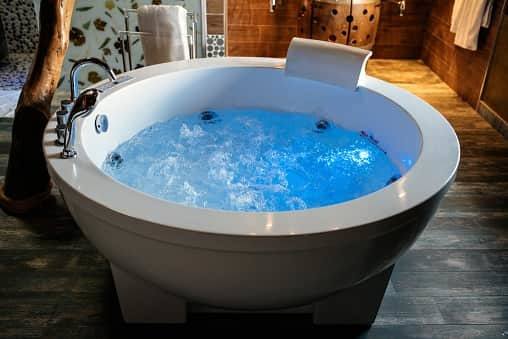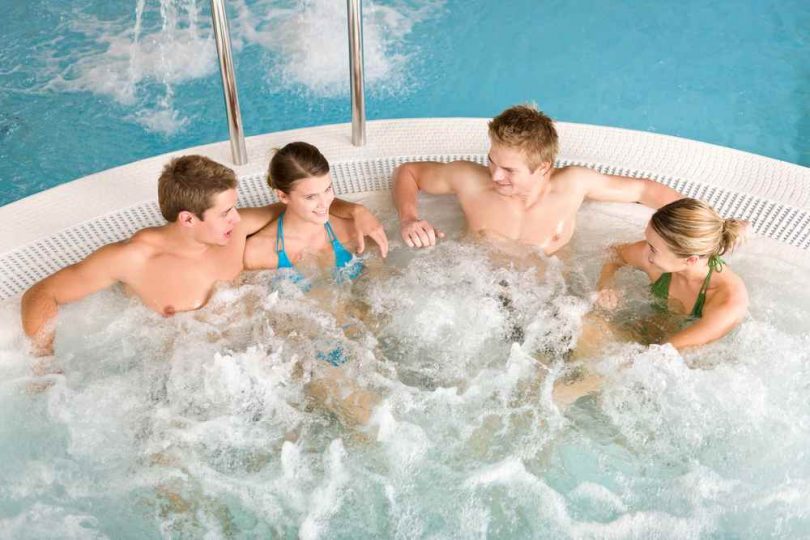It’s important to decide whether your hot tub will be chlorinated or saltwater. Having a home spa isn’t just about having good water. You also need to think about how you’ll keep it clean.
Whatever you choose, taking care of your spa is a continuous process. Whichever you choose is up to you. There are pros and cons for both types.
Saltwater vs Chlorine Hot Tubs – A Quick Comparison
| Comparing factors | Saltwater | Chlorine |
| Virus and bacteria | A greater chance of forming bacteria and viruses | Safe from bacteria and viruses |
| Irritation | Safe for sensitive skin and eyes | Irritation may happen due to chloramine |
| Odor | No unpleasant odor | A strong smell of chlorine |
| Water softness | Keeps your water soft for a long time | Doesn’t last long |
| Chlorine | Needs to be added separately | Produces naturally-occurring chlorine |
| Maintenance | Requires tricky maintenance work | Doesn’t require much work |
| Maintenance cost | More | Less |
| Installation | Complicated | Easy |
| Installation cost | Costs more | Costs less |
| Effects on soil and plant | Plants can be killed and soil nutrients can be diminished | Doesn’t have any harmful effect |
| Damage to fixtures | Yes | No |
| Banning | Banned in some states | Not banned anywhere |
| Cost | On average, $6,000 to $18,000 | Between $5,000 and $8,000 (luxury ones to $16,000) |
Advantages of Saltwater Hot Tubs
Safe for sensitive skin and eyes
In saltwater hot tubs, chlorine is naturally generated, which means chloramines aren’t likely to build up.
Maintenance is cheaper
The salt system will continuously sanitize water. Advanced saltwater tubs can adjust the salt content themselves with heavy use.
Eco-friendly
When used regularly, it keeps water fresh and clean for a year. Then you have to drain and refill it.
No unpleasant odor
The salt system stops the chlorine from changing into chloramines that give off an unpleasant odor.
Improved water resilience and softness
A saltwater system can keep your water soft for a long time since it produces a moderate amount of chlorine. Afterwards, you need to drain and refill.
Water’s ability to buffer
You become more resistant to water chemistry changes when you add the right amount of salt to the water. Minerals in saltwater help stabilize pH, alkalinity fluctuations, and calcium hardness.
Forget the sanitizer

Unlike chlorinated water systems that need to be constantly added to, saltwater systems produce naturally-occurring chlorine.
Disadvantages of Saltwater Hot Tubs
Cost is higher
It is expensive to buy a saltwater hot tub. Additionally, the cost of saltwater replacements is higher than that of chlorine-powered systems.
Corrosion requires more maintenance
Excessive salt in the water may damage liners, underwater lighting, and heaters since salt tends to corrode metals.
Harmful to soil and plants
Plants can be killed and soil nutrients diminished by saltwater. As a result, saltwater hot tubs have been banned in some states.
Extra maintenance time needed
Saltwater systems require that you inspect cells carefully to determine if they function properly.
I’d recommend soaking it for approximately 8 hours in distilled white vinegar after the cell is removed from its casing.
Strict water temperature rules
A salt water tub system can quickly become unsanitary if it is not properly maintained.
If the water temperature in the system does not reach 60 degrees F, then the right amount of chlorine cannot be produced then bacteria grows.
Advantages of Chlorine Hot Tubs
Simple to maintain
There is no complicated equipment found in a chlorine hot tub like there is in a saltwater hot tub. While chlorine hot tubs do not use saltwater chlorine generators, saltwater hot tubs do have specialized equipment to electrolyze the water.
Won’t damage fixtures
Chlorinated hot tubs are less likely to damage the hot tub’s components than saltwater hot tubs. To make sure that your hot tub accessories are safe, you should use chlorinated water.
Minimized bacteria
As a result of its high toxicity, chlorine is highly effective in killing bacteria and germs that cause disease in the water.
You should choose a chlorine-based sanitizer if you intend to have an ideal spa.
Disadvantages of Chlorine Hot Tubs
Irritations
The chlorine in the hot tub can be contaminated by your saliva, cosmetic products, and even sweat while you take a bath.
It produces chloramines, which cause irritation to your skin and eyes. Experiencing chlorine repeatedly can result in a rash on the skin.
Strong odor
Chlorine is known for its strong, pungent odor. In most cases, the funky smell is not from chlorine, but it is due to all the chemicals that build up.
Saltwater vs Chlorine Hot Tub: How Do They Differ?
Chlorine level
Saltwater pools have a greater chance of forming bacteria and viruses, especially when the temperature of the water drops.
Chlorine is safe from bacteria and viruses as chlorine kills bacteria and toxins in the water.
Affordability
Salt water tubs cost, on average, $6,000 to $18,000 to buy a salt water hot tub. Salt water systems cost $500 to $1,800 to install in an existing hot tub.
Chlorine hot tubs cost between $5,000 and $8,000, while luxury ones cost up to $16,000.
Upkeep
Saltwater systems require specific maintenance that can otherwise easily create an unsanitary environment and bacteria are most likely to grow there.
Chlorine systems don’t require as much work, and no salt water generators to use.
Installation complexity
Salt water systems are more complicated to install, thus entailing high installation and maintenance fees.
Chlorine installation is easier without needing to install equipment to electrolyze the water.
Longevity
You can get up to 20 years from both types of spas as long as you maintain them as required and follow all the directions required for cleaning, sterilizing, and adding chemicals.
It depends on how well you look after them and if you keep them covered.
Which One is the Right Choice for You?
Each type comes with its own pros and cons. Only you can decide which is right for you.
Whatever type you prefer, you can rest assured that each will create a comfortable, relaxing environment.
When it comes to taking care of your skin, you should go with saltwater, but if you want a less-maintenance option, go with a chlorine hot tub.
FAQs
1. How often do I need to add salt to my hot tub?
Ans. Salt is typically only needed when filling the tub! Every time you drain and fill the tub, you should add it again.








Leave a Comment